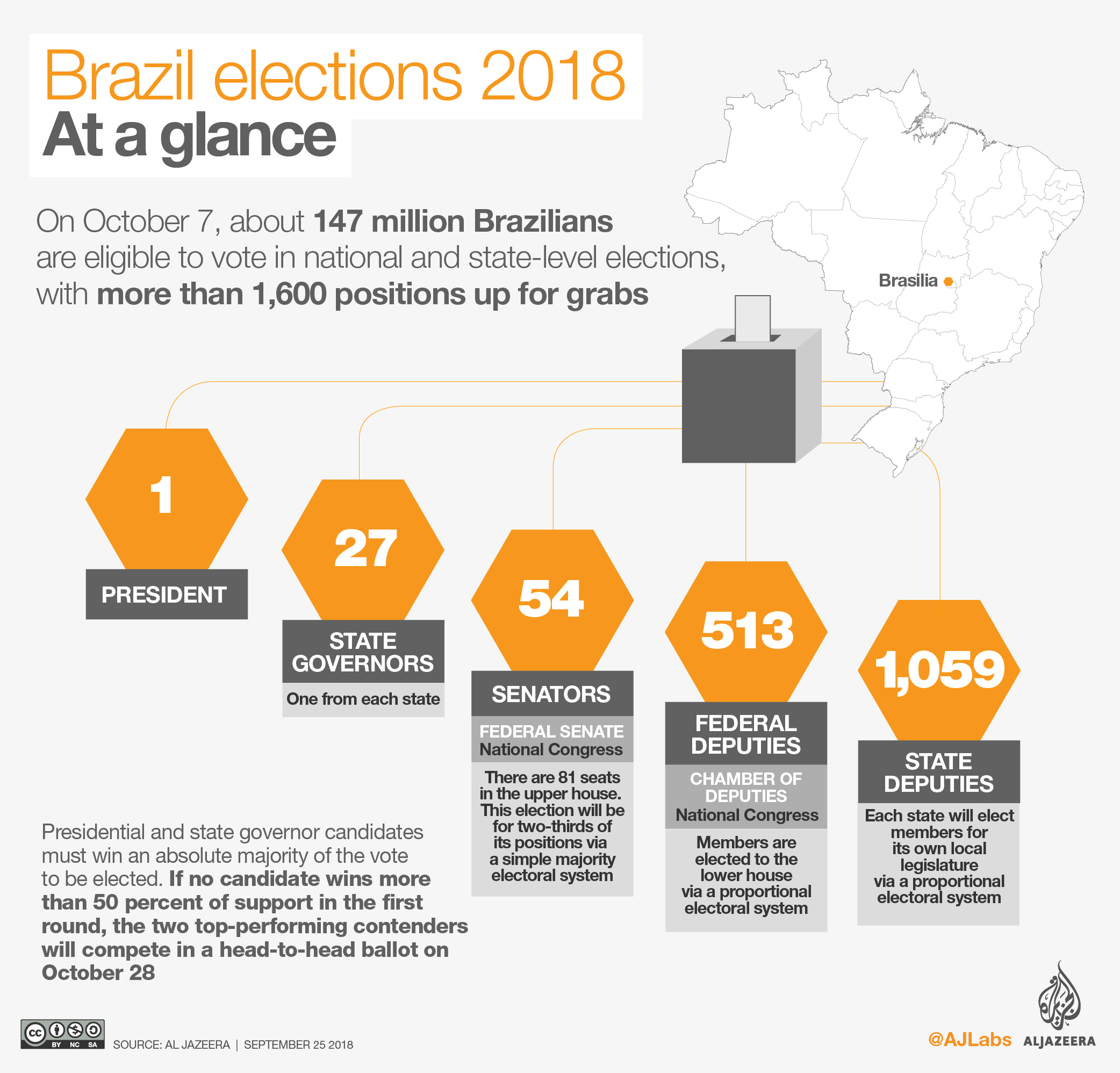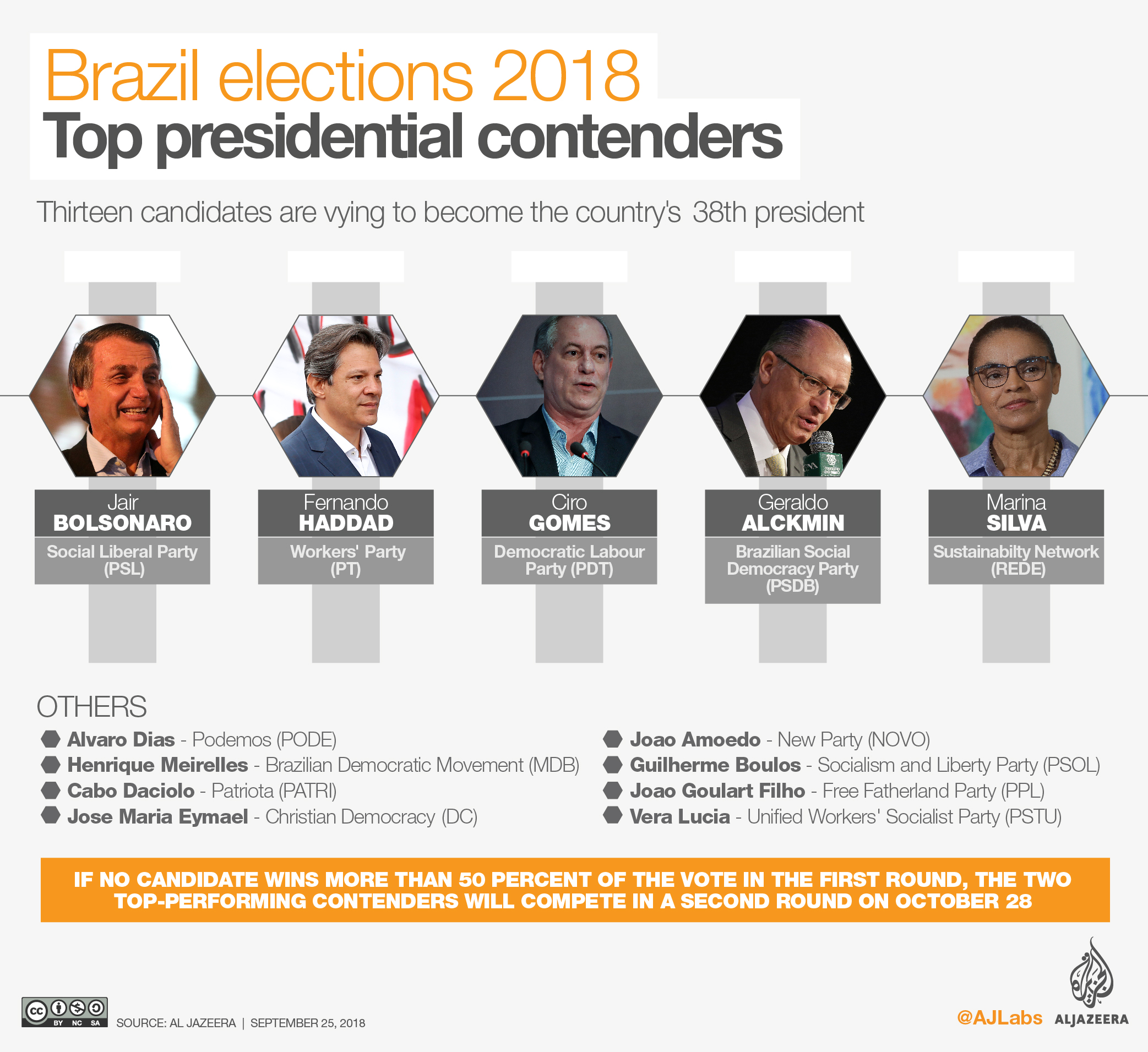Brazil presidential debate highlights deep election divides
Opponents slam leading leftist and far-right candidates amid rampant polarisation before October 7 poll.

Rio de Janeiro, Brazil – Brazil’s deeply polarised presidential race took centre stage on Sunday as election hopefuls sparred during a debate in advance of the country’s national and state-level elections.
Several candidates rounded on far-right frontrunner Jair Bolsonaro of the Social Liberal Party (PSL) and the leftist Workers’ Party (PT) candidate Fernando Haddad during the event, held in Sao Paulo, and implored voters not to elect either contender.
Keep reading
list of 4 itemsKey takeaways as ex-Trump lawyer Michael Cohen testifies in New York trial
Will Israel’s war on Gaza sway South Africa’s election?
Lithuania’s Nauseda wins first round of presidential election
Bolsonaro, who was absent from the debate as he continues to recover from an assassination attempt last month, is projected to win about 28 percent of support on October 7, according to Datafolha polling institute.
Haddad, the PT’s replacement candidate for widely popular former president Luiz Inacio “Lula” da Silva, is forecast to win 22 percent of the vote.

If no candidate is able to secure more than 50 percent of support in the first round, the two contenders with the highest number of votes will go head-to-head in a second ballot on October 28.
“With Lula Brazil lived a happy time … we lived the most democratic period of Brazilian history,” Haddad said on Sunday, referring to the former leader’s time in office from 2003-2010.
“The image I visualise is Brazilians with a book in one hand and a labour identity card in the other,” he added.
Polarised election
Aside from Haddad and Bolsonaro, no other participant is predicted to win more than 11 percent of the vote on October 7.
Despite leading the polls, however, Bolsonaro and Haddad are also widely disapproved of, with rejection rates of 46 percent and 32 percent respectively.
During the debate, those trailing behind the pair pleaded with Brazilians not to elect either of them as president, alleging they both represent “radical” positions.
Democratic Labour Party candidate Ciro Gomes said a “capacity of dialogue” was needed to end deepening polarisation.
“Brazilian politics is immersed in hate, and I hope in the name of God that the population touches their conscience to run from this environment of hate,” Gomes said.
“No country in the world would be able to support the consequences of what is ahead of us. In the last four years, Brazil hasn’t stopped to discuss the mess of unemployment and the violence resulting from this,” he added.
Nearly 13 million Brazilians are unemployed, while homicides rose to a record high figure of 63,880 nationwide last year, according to the Brazilian Forum of Public Security.

Geraldo Alckmin, the Brazilian Social Democracy Party (PSDB) candidate, said that “half of the population don’t want either the left radicals or the right radicals”.
Sustainability Network candidate Marina Silva, meanwhile, accused the PT and Bolsonaro of being “canvassers of each other”.
Alberto Almeida, political scientist and author of, The Vote of the Brazilian, said the other candidates’ concentration on the two frontrunners could backfire and convince voters the “only options must be those [two]”.
“The PT and Bolsonaro were the most spoken about,” Almeida said.
“Bolsonaro, without even being present, and the PT by the mouth of others [because] even when Haddad wasn’t speaking the others spoke a lot about PT,” he added.
‘A shame he is not here’
Criticism of Bolsonaro was a major theme of Sunday’s debate, with several candidates lambasting the former army captain.
“I have never seen a presidential candidate who says he will govern for the strong ones, as a president you have to defend the most vulnerable people,” Silva said.
“It’s a shame he is not here, I hope he comes in the next debate to explain his positions,” she added, referencing the final presidential debate, scheduled to be held in Rio de Janeiro on October 4.
Bolsonaro has made several overtly misogynistic comments in the past, as well as controversial statements on issues relating to race, sexuality and Brazil‘s military government, which was in power between 1964 and 1985.
Shortly after the debate finished, Bolsonaro said in a post on Twitter that his absence was being used to try and score political points by other candidates.
“Many celebrated the attack I suffered because they saw an opportunity of attacking me with no chance of defending myself, this in a scenario which was already unbalanced. It reflects well our current situation. Corrupt cowards seeking power by any means are not thinking of Brazil,” he said.
Thiago de Aragao, director at the Brasilia-based political consultancy Arko Advice, said Bolsonaro’s campaign was making “childish mistakes one after the other”.
“They are prolific in manufacturing ammunition against themselves,” Aragao said.
“Haddad, on the other hand, is gaining ground from Lula’s nostalgic popularity, as well as from the sequential mistakes produced by Bolsonaro regarding his campaign,” he added.
Sunday’s debate took place hours after several thousand people participated in nationwide pro-Bolsonaro rallies.
The demonstrations, which took place in cities including Sao Paulo and the capital, Brasilia, followed mass marches on Saturday as part of the women-led #EleNao (#HimNo) protests against Bolsonaro.
The protests were attended by hundreds of thousands of Brazilians.